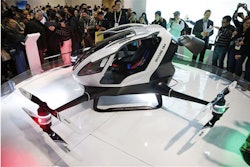British theme park Alton Towers has announced that it will create what it claims to be the first ever rollercoaster to fully revolve around a virtual reality experience.
Slated to open in April, Galactica will present adventurous ride-goers with a launch that the company claims is “more powerful than a real rocket launch,” producing a total g-force of 3.5. The space suit-donning riders will experience VR-headset-produced stars, wormholes, and other interstellar marvels, with each view synched to the movements made throughout the 2,760-foot, 189-second trip. The company said one of the destinations will be Kepler-5, with other sites to be announced at a later time. The Galactica will travel at a top speed of roughly 46.6 mph and drop up to 65.6 feet, with a capacity of 28 passengers.
“Galactica uses ground breaking technology to give riders a breathtaking and completely unique rollercoaster experience,” said Gill Riley, the marketing director of Alton Towers Resort, in a press release. “Tim Peake captured the imagination of millions of Brits last year when he set off on his mission to the International Space Station — and now our visitors can become astronauts too.”
She added, “There is nowhere else in the world that people can experience the feeling of a flying rollercoaster combined with soaring through the universe.”
The seats on the ride will look like jetpacks. The resort will also incorporate droids built by Estonia-based R&D company Cybernetica, whose purpose will be to “form your ‘ground crew’ ensuring that you are ready for space travel,” according the Alton Towers website.
According to the BBC, Galactica will be the first large ride to be opened at Alton Towers since one of its rollercoasters crashed in June, seriously injuring five people. The report said that the company blamed the accident on “human error.”






















